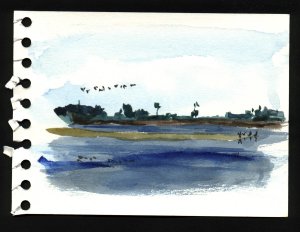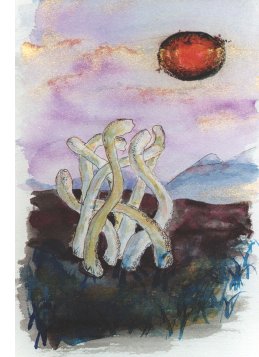Excerpts from the interview (conducted by Karen Haber):
I vaguely remember starting to draw before kindergarten, my mother cutting up brown paper grocery bags for me to scrawl on. All through grade school I wrote and drew interminably long comic books, which she would bind with string. She also got me started painting. The summer after third grade I got badly sunburned at the beach, and since I couldn't go outside she bought me some simple paint-by-number oil paints to distract me. She was an enthusiastic amateur artist, at various times being consumed by oils, watercolors, sumi-e, and ceramics. I did all of those, too, studying her books. Never took any classes myself, until right after I got out of the army. We went to Mexico for the summer and I took my one and only university art course, drawing figures and portraits in ink. Every now and then I go to a workshop on painting portraits or landscapes or (once, because the instructor was gorgeous) flowers. Once a week I go to an open figure studio no instruction, just plunk down your ten bucks and paint the woman.
*
 Most of my paintings are travel notes, so I just walk around with a folding camp chair and my watercolor kit until I find something that's interesting and paintable. Or just carry a small watercolor box, half-pans, and look for something that's (A) paintable and (B) has a place to sit. When I do an abstract I either think in terms of formal composition what shapes should go where on the page, or what combination of colors do I want to play with? I usually do a few small-scale sketches. Sometimes I just doodle shapes with a pen or pencil and look for interesting relationships in the random spaces that show up.
Most of my paintings are travel notes, so I just walk around with a folding camp chair and my watercolor kit until I find something that's interesting and paintable. Or just carry a small watercolor box, half-pans, and look for something that's (A) paintable and (B) has a place to sit. When I do an abstract I either think in terms of formal composition what shapes should go where on the page, or what combination of colors do I want to play with? I usually do a few small-scale sketches. Sometimes I just doodle shapes with a pen or pencil and look for interesting relationships in the random spaces that show up.
*
Comparing painting to writing, and the preparation for both, is kind of talking apples and oranges, but there is a correspondence. In both cases, sometimes there is no preparation at all; I just start and see where things go. I do sometimes write down notes, or a kind of a free-form outline, for a short story; I guess that would be the equivalent of rough composition sketches for a painting. Sometimes I write down the central idea of a short story and look at it on the bulletin board for years, until it suddenly crystallizes (that happened with 'None So Blind'.) There's no exact equivalent to that, but I do often indulge in 'mental painting'; visualizing future paintings while I'm stuck in line or in a traffic jam. A real painter would probably whip out a little pad and make some notes. I wind up with a vague recollection that might surface subconsciously.

*
''As for science fiction, I think most of my abstract paintings have a science-fiction 'feel,' but that may just be because I'm a science fiction guy. The paintings I've done in a realistic science fiction vein have not made me happy. But then I've been enjoying the masters of the form, from Hannes Bok to Jim Burns, since I was a kid, and relate to their work in an emotional way that is different from the way I relate to other art. I'd enjoy illustrating my own work when I'm good enough. I actually have two modest projects in the works, which I don't want to talk about until they're done.''

